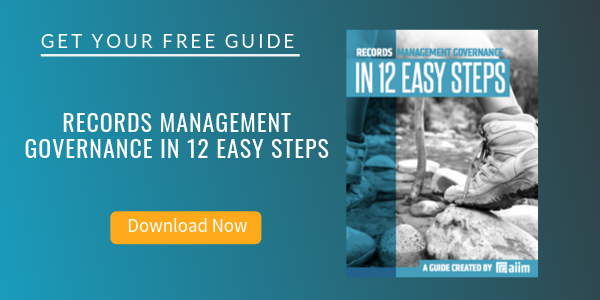
The IRS E-mail Scandal, or How the Dog Ate My Homework – Information Governance
I have been out of the country for about a week, so forgive my tardiness in commenting on the IRS e-mail story that has been percolating in the US press for the past week
Most of the press stories I’ve seen while on a belated 30th anniversary trip to Sorrento (we’re on the verge of our 34th anniversary, so I guess it’s about time) have centered around the poor performance of the British and the Italians and the Portuguese in the World Cup. At the end of the personal trip, I attended an AIIM Executive Leadership Council meeting, but more on that in a minute.
 [Note: I do not intend this post as some sort of political statement. Really. There are lots of other folks out there who seem to love to tee up just about any story as an “Us vs. Them” story, regardless of the merits of the issue. I even saw one lunatic story during a brief foray into Facebook while on our trip, equating the rise of soccer in the US with the decline of America. Sigh. I intend this as a post on information competency.]
[Note: I do not intend this post as some sort of political statement. Really. There are lots of other folks out there who seem to love to tee up just about any story as an “Us vs. Them” story, regardless of the merits of the issue. I even saw one lunatic story during a brief foray into Facebook while on our trip, equating the rise of soccer in the US with the decline of America. Sigh. I intend this as a post on information competency.]
So let me get this straight.
Some excerpts from a June 23 New York Times article I am reading on-line “whilst” sitting in Heathrow (I thought I would use the British since I’m still here):
The commissioner of the Internal Revenue Service, John Koskinen, testified before the House Oversight Committee on Monday to answer questions about how two years’ worth of emails sent and received by Lois Lerner, the former official at the center of a growing I.R.S. scandal, could have been destroyed, and why the agency waited until just recently to tell Congress.
…
Q. How many emails are missing?
A. It is impossible to know for sure, because the agency says that the emails in question were destroyed when Ms. Lerner’s computer hard drive crashed in June 2011.
…
Q. Even if Ms. Lerner’s hard drive crashed, how could her emails have just disappeared? Were they backed up?
A. Apparently not, at least not permanently. Before it changed its storage policies last year, the I.R.S. backed up emails onto old-fashioned tape drives. Every six months, it reused those tapes, thus erasing the previous batch.
…
When many of these systems were installed, computer storage was much more expensive than it is now. So they were intended for “disaster recovery, not e-discovery” for legal purposes, said Jonathan Feldman, the chief information officer for the City of Asheville, N.C., who has consulted for large companies and written extensively about data management practices. “I.T. people weren’t concerned with document retention.”
And then another piece from CNN on June 24:
David Ferriero, who heads the National Archives and Records Administration, told a House panel that the IRS "did not follow the law" when it failed to tell his agency about the loss of emails belonging to former IRS official Lois Lerner.
And then another story PoliticoPro on June 26 noting “EPA joins IRS lost emails club."
You just can’t make this stuff up.
To make this doubly ironic, the aforementioned Executive Leadership Council meeting I attended at the end of our anniversary trip was on Information Governance.
In a digital economy, how you manage your digital assets is just as important as how you manage your physical assets or your financial assets or your people assets. And certainly, the history of either political party is loaded with stories about the abuse of electronic information.
Regardless of political persuasion, though, saying that multiple simultaneous personal hard drive crashes caused the loss of the emails in question stretches the imagination. Saying that you can’t produce emails because your hard drive crashed is the digital equivalent of “the dog ate my homework.” In this era, organizations should simply know better than to expose themselves to this kind of information management risk -- the net result is an endless cycle of skeptical question that is endlessly distracting and destructive.
Organizations of all shapes and sizes have to start taking information governance serious now. Don’t wait until you are on the front page of the New York Times.
About John Mancini
John Mancini is the President of Content Results, LLC and the Past President of AIIM. He is a well-known author, speaker, and advisor on information management, digital transformation and intelligent automation. John is a frequent keynote speaker and author of more than 30 eBooks on a variety of topics. He can be found on Twitter, LinkedIn and Facebook as jmancini77. Recent keynote topics include: The Stairway to Digital Transformation Navigating Disruptive Waters — 4 Things You Need to Know to Build Your Digital Transformation Strategy Getting Ahead of the Digital Transformation Curve Viewing Information Management Through a New Lens Digital Disruption: 6 Strategies to Avoid Being “Blockbustered” Specialties: Keynote speaker and writer on AI, RPA, intelligent Information Management, Intelligent Automation and Digital Transformation. Consensus-building with Boards to create strategic focus, action, and accountability. Extensive public speaking and public relations work Conversant and experienced in major technology issues and trends. Expert on inbound and content marketing, particularly in an association environment and on the Hubspot platform. John is a Phi Beta Kappa graduate of the College of William and Mary, and holds an M.A. in Public Policy from the Woodrow Wilson School at Princeton University.



